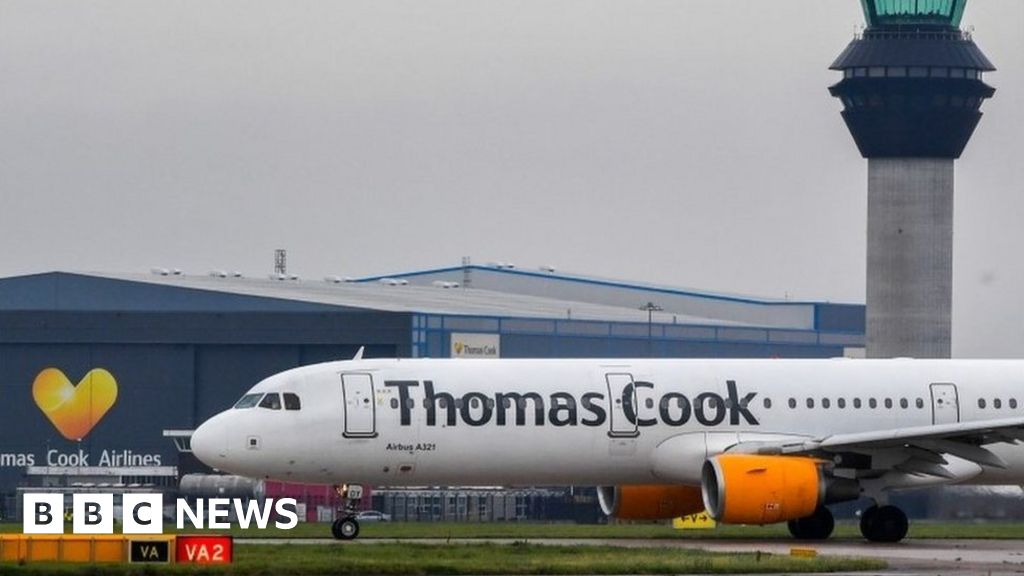Thomas Cook: Taxpayers Face £156m Bill For Company's Collapse

 Image copyright
Getty Images
Image copyright
Getty Images
Taxpayers face a bill of at least £156m for the response to the collapse of Thomas Cook, according to a report by the government's spending watchdog.
The travel company's collapse last September left 9,000 staff out of work and 150,000 holidaymakers stranded.
The National Audit Office (NAO) said the government had agreed to pay £83m towards the cost of getting customers back home, as well as £58m in redundancy and related payments.
But the final cost is not yet known.
Other costs include at least £15m for liquidating the business.
When the world's oldest travel company collapsed, the Department for Transport (DfT) instructed the Civil Aviation Authority (CAA) to repatriate all 150,000 Thomas Cook customers who were stranded overseas.
This included roughly 83,000 who had not booked a trip with Atol protection, which meant they were not automatically entitled to be flown home free of charge.
The DfT is reimbursing the cost of repatriating those passengers.
However, the NAO said "the final cost may not be known for some time", partly due to invoices for repatriation costs still being received.
Labour MP Meg Hillier, who chairs the Commons' Public Accounts Committee said "lessons need to be learnt and future risks understood".
"Government looks set to foot the bill, with industry off the hook," she said.
"The resources to cover other airlines going bust is now very limited. New regulations are urgently required."
A DfT spokesperson said: "Due to the unprecedented scale of the operation, other airlines did not have enough capacity to repatriate those abroad.
"Without this effort, stranded passengers couldn't be guaranteed a safe journey home, causing stress and disruption to families, which would have had a knock-on effect on the wider economy with so many employees abroad."
A total of 746 flights from 54 airports were involved in the repatriation effort, known as Operation Matterhorn.
The report also warned that limited resources would be left in the fund which provides assistance to customers whose holidays are protected by the Atol scheme.
The CAA told the NAO the £481m of repatriation and refund costs related to the Thomas Cook collapse would deplete the majority of the fund's resources.
The NAO said the government had agreed to back up that fund, if it cannot meet the costs should any other Atol-licensed company go bust.
This could mean further costs to taxpayers if another large travel company collapses in the near future, the report added.
In December last year the government confirmed plans for new airline insolvency legislation, which would allow carriers to keep their planes flying long enough to repatriate passengers.
From Chip War To Cloud War: The Next Frontier In Global Tech Competition
The global chip war, characterized by intense competition among nations and corporations for supremacy in semiconductor ... Read more
The High Stakes Of Tech Regulation: Security Risks And Market Dynamics
The influence of tech giants in the global economy continues to grow, raising crucial questions about how to balance sec... Read more
The Tyranny Of Instagram Interiors: Why It's Time To Break Free From Algorithm-Driven Aesthetics
Instagram has become a dominant force in shaping interior design trends, offering a seemingly endless stream of inspirat... Read more
The Data Crunch In AI: Strategies For Sustainability
Exploring solutions to the imminent exhaustion of internet data for AI training.As the artificial intelligence (AI) indu... Read more
Google Abandons Four-Year Effort To Remove Cookies From Chrome Browser
After four years of dedicated effort, Google has decided to abandon its plan to remove third-party cookies from its Chro... Read more
LinkedIn Embraces AI And Gamification To Drive User Engagement And Revenue
In an effort to tackle slowing revenue growth and enhance user engagement, LinkedIn is turning to artificial intelligenc... Read more

